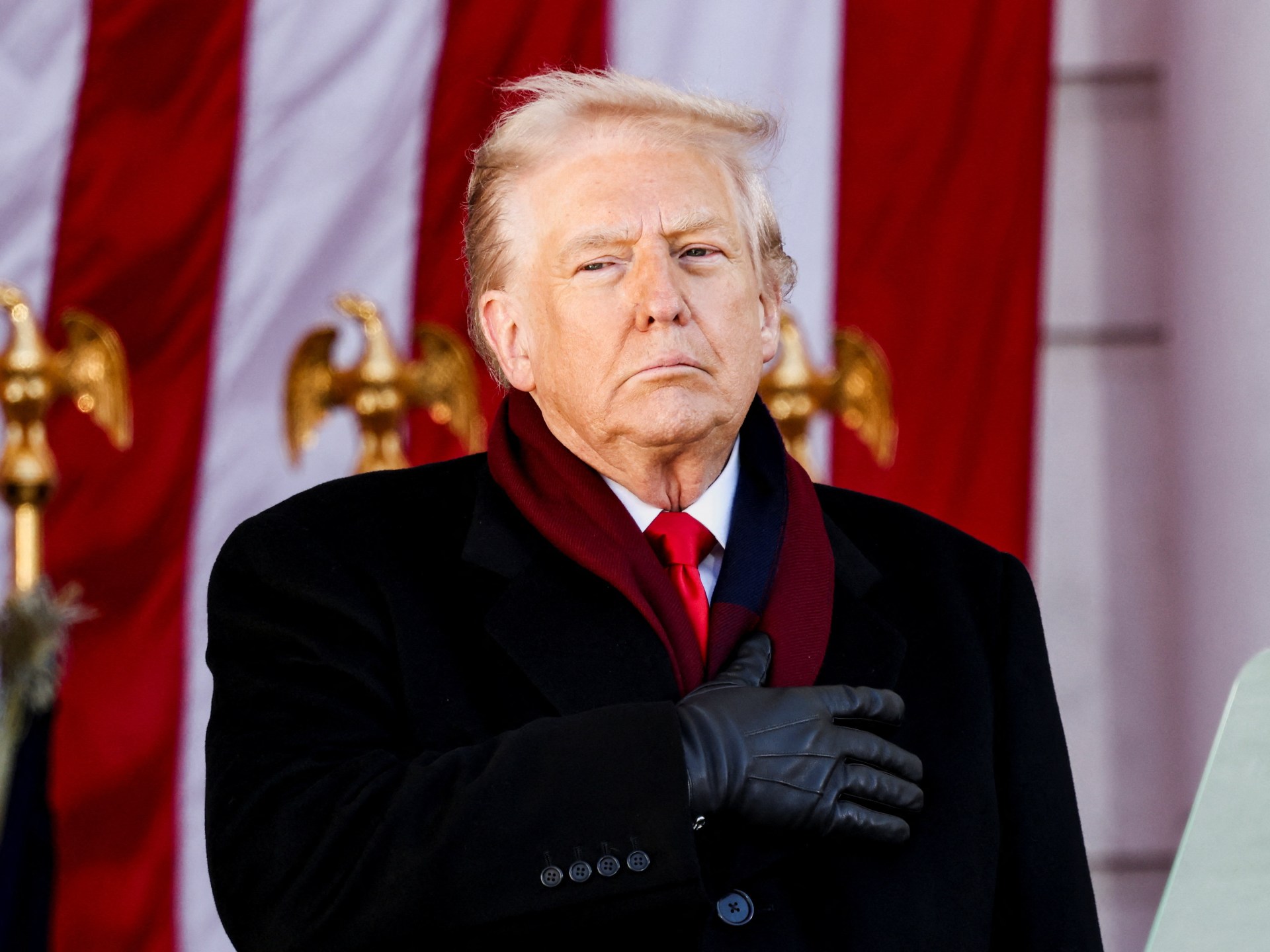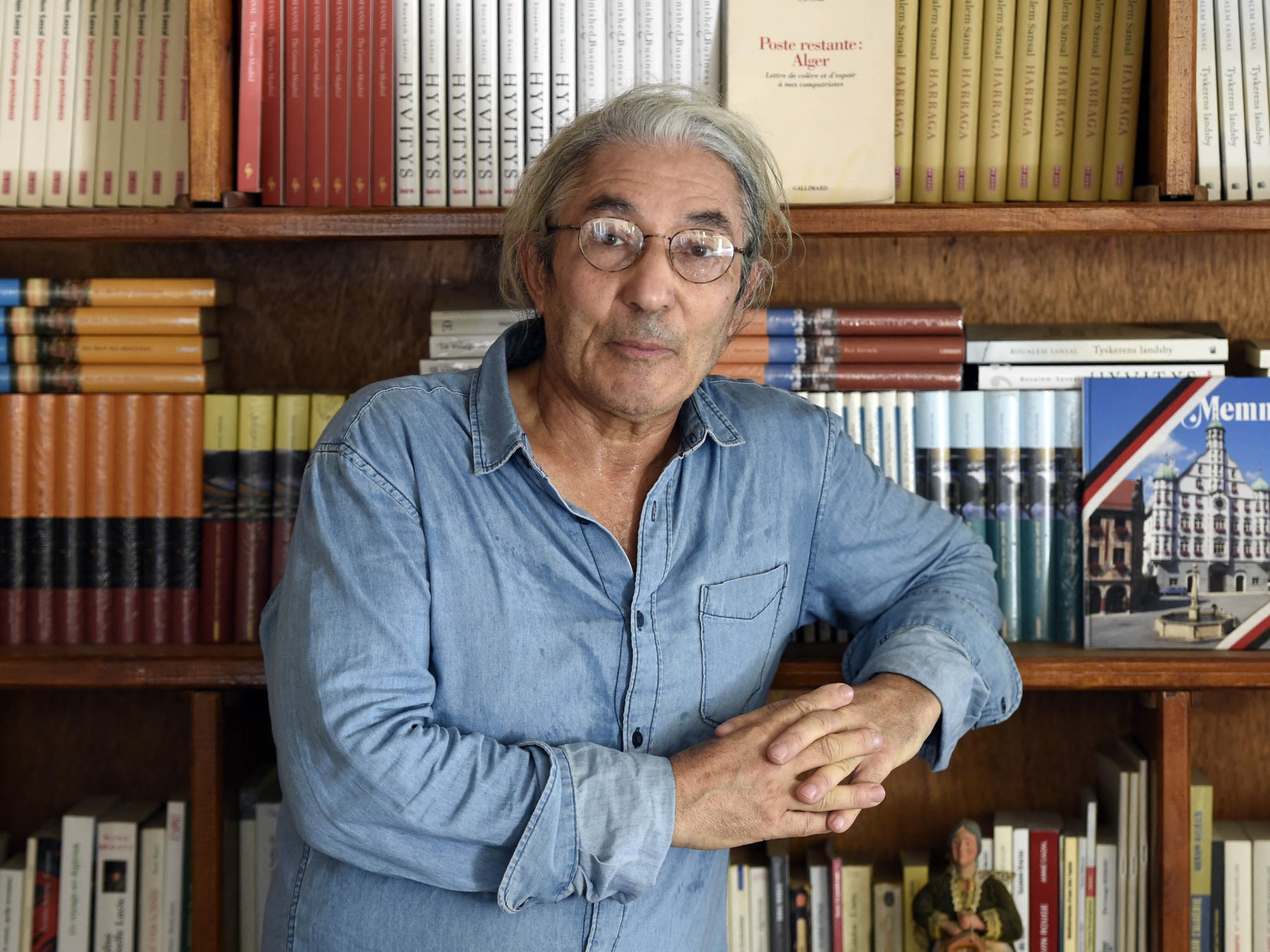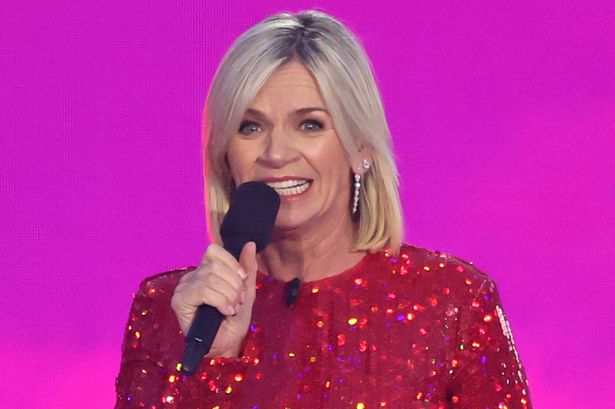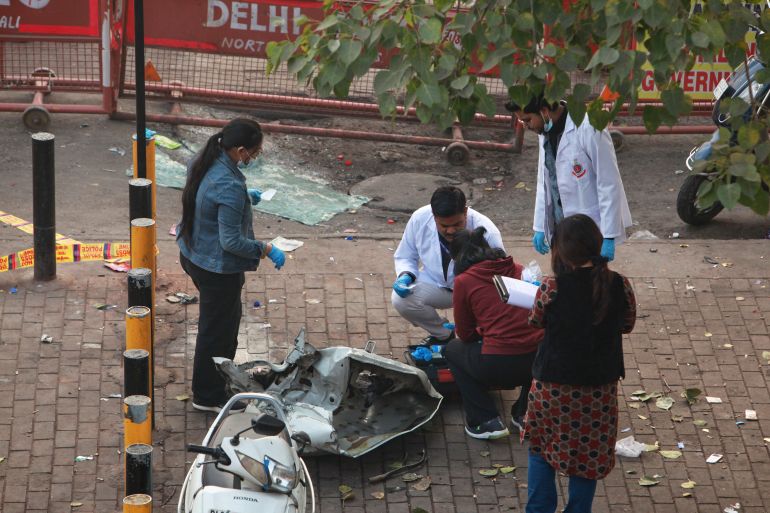Trump live: US House Democrats release Epstein emails before shutdown vote



Algeria has agreed to pardon French-Algerian writer Boualem Sansal, who has been detained for a year on charges of “undermining national unity”.
Algeria’s presidency announced plans to free the 81-year-old writer on Wednesday, saying President Abdelmadjid Tebboune had accepted a request from his German counterpart to pardon him on “humanitarian grounds”.
list of 3 itemsend of list
Sansal, a prize-winning author in francophone North African literature, is known for his criticism of Algerian authorities.
He was arrested last November after giving an interview in which he said that France had unjustly transferred Moroccan territory to Algeria during the colonial period from 1830 to 1962 – a claim Algeria views as a challenge to its sovereignty.
In March, Sansal was sentenced to five years’ imprisonment under “anti-terrorism” laws. He has slammed the case against him as senseless, arguing Algeria’s constitution “guarantees freedom of expression and conscience”.
When questioned about his writings during a court session in June, Sansal asked: “Are we holding a trial over literature? Where are we headed?”
Sansal’s case has soured relations between Algeria and France, which nosedived last summer when France shifted its position to recognise Morocco’s sovereignty over the disputed Western Sahara territory, and which were further aggravated when Algeria rejected French attempts to return Algerians slated for deportation.
While France had urged for leniency in Sansal’s case, Algeria was more responsive to the intervention from Germany, whose President Frank-Walter Steinmeier appealed to his “longstanding personal relationship” with Tebboune in issuing the pardon request.
Sansal’s daughter Sabeha Sansal told the AFP news agency that she was relieved following the pardon and hoped to see her father soon.
Human rights advocates in Algeria claim the country has used the controversial “anti-terrorism” law employed in Sansa’s case to stifle dissent following the 2019 pro-democracy Hirak protests.
On Tuesday, Algerian poet and activist Mohamed Tadjadit – who rose to prominence for his public recitations during the Hirak demonstrations – was jailed for five years on charges including “condoning terrorism”. About 20 NGOs, including Amnesty International, have denounced the allegations against him as “baseless” and called for his release.
Also imprisoned in Algeria is French sports journalist Christophe Gleizes, who was found guilty in June for “glorifying terrorism” after he allegedly communicated with an official of a football club in the Kabyle region who also heads a banned Kabyle nationalist group, according to France’s Le Monde newspaper.

Zoe Ball has moved a mystery man into her home. The BBC radio legend has hinted at a possible new romance while revealing that her “lodger” is successful and has bagged a string of awards over the course of his career.
It comes two years after Zoe, 54, split from construction worker Michael Reed after the pair had been dating for five years. At the time, friends said their relationship had “run its course”. But Zoe has now told her pal Jo Whiley that there could be a new man on the horizon for her.
“I’ve got this thing that I bought online, which is sort of like you hold the handle and it’s loads and loads of different bits of wood and you whack your legs and your underarms with it,” she said.
Speaking on her Dig It podcast, the broadcaster went on to add: “It really helps circulation. I think it’s quite good for lymphatic drainage. I bought loads of them for people for Christmas.” Addressing the mystery man, Zoe continued: “I remember the first time the lodger walked in and saw me doing it, and just sort of turned on his heels.”
Jo asked whether the man was “still around,” to which Zoe confirmed he was. She said: “He’s still here at the moment, he’s still lodging.” But she refrained from identifying him.
She did, however, build a picture of the man and his success while saying he had “won loads of awards.” Reflecting on her own trophies, Zoe said: “I did get a Sony and it was given to me by Marianne Faithfull. I was well chuffed. And I think Caner of the Year for something I can’t remember. “
Zoe went on to say: “We won a BAFTA for the last ever Live and Kicking, which was amazing. But I don’t even have a copy of it. Yeah, the lodger has won loads of awards.”
It comes after Zoe addressed speculation that she could be gearing up to take over presenting Strictly Come Dancing following the departure of hosts Tess Daley and Claudia Winkleman. The presenter had previously hosted It Takes Two.
“I think everyone would like to do that job,” she said when Jo asked her if she wanted to do it. “It’s an amazing job, it’s the best Saturday night show. When I’m watching Ellie dancing with Vito or Lewis and Katya and Alex and JoJo…. they’re just so amazing. It still brings so much joy to people’s lives, that show. Whoever takes over will have the best gig in the world.”
The star is the first major name to put their hat in the ring for the job, with he likes of Rylan Clark, Janette Manrara and Fleur East all being the bookies’ favourites to get the job.
Zoe was said to have been “gutted” after the breakdown of her relationship with Michael two years ago, but realised she was happy to live alone. A source at the time told The Sun: “Zoe is gutted but she’s better off without Michael.
“This is a relief to many of her friends, who think she has done the right thing. They were arguing over really silly things like Zoe spending time on the phone to her friends and it all got a bit too much for her.”
The source went on to state that while they had a great relationship and Michael was a “real gent”, they started to spend time apart on separate holidays and began to drift apart. Despite their split, she remained good friends with Michael.
The Mirror has approached Zoe’s spokesperson for comment.

Quilter Nations Series: England v New Zealand
Venue: Allianz Stadium, Twickenham Date: Saturday, 15 November Kick-off: 15:10 GMT
Coaching the All Blacks is one of the most pressurised jobs in world rugby, but current incumbent Scott Robertson says he is determined to “turn the expectation into joy” as his side bid for a Grand Slam tour.
Despite an inconsistent first two years in charge by All Blacks standards – 19 wins and six defeats in 25 matches – Robertson and his side are in London this week with a first home nations clean sweep since 2010 in their sights.
The All Blacks dug deep to battle past Ireland in Chicago before withstanding a Scottish fightback in Edinburgh last weekend.
And with England resurgent, unbeaten in nine games and looking for a first victory over New Zealand at home since 2012, the stage is perfectly set for their meeting with England on Saturday at Allianz Stadium in Twickenham.
“It’s at the so-called home of rugby, with a full house and an expectant English team,” he tells the Rugby Union Weekly podcast from the All Blacks’ team hotel.
“We want a Grand Slam; they want to take our scalp. How good is footy?

With a host of All Blacks greats leaving the international stage since the 2023 Rugby World Cup, New Zealand are still in a state of transition under Robertson.
While there have been some stirring wins, such as over South Africa at Eden Park to maintain their unbeaten run in Auckland, a record defeat by the Springboks a week later and two losses to Argentina on Robertson’s watch have muted the enthusiasm of the New Zealand rugby public.
“In its entirety we’ve had some great results and we’ve fought back from some great adversity,” Robertson explains.
“We’ve played some really good footy and exposed 20 debutants over the past two years. We’ve got a lot of guys who have stepped up and we feel we have a good foundation.”
But while it is not a vintage All Blacks side yet, they are still ranked number two in the world and boast a handful of superstars, from backrowers Ardie Savea and Wallace Sititi to generational players like Beauden Barrett and Will Jordan behind the scrum.
And according to Robertson, the group is determined to make the most of a rare chance to play all four home nations in consecutive weekends.
“It just keeps giving,” Robertson says about the end-of-year tour.
“You have 13 Test matches in a year, and every week [is huge]. You beat the All Blacks and you’ve had a great year. So every team [wants the scalp].

Three times Robertson’s New Zealand met Steve Borthwick’s England last year, and three times England were ahead after an hour only for the All Blacks to turn the screw in the final quarter.
It has been a similar story over the past fortnight, as the All Blacks finished strongly to edge out Ireland and Scotland.
And with Borthwick stacking his bench this weekend, keen to rectify the problems of a year ago, both head coaches are planning for it to go down to the wire at the Allianz Stadium.
“The first thing is you have to trust yourself and keep playing,” Robertson says about those decisive minutes.
“That is the key, and that’s what we have done, and I’m sure that is what England are focusing on as well.
“Who is going to put their hand up, and who is going to take that moment?

A Premier League proposal to introduce a controversial salary cap will be legally challenged by some clubs, according to the head of the Professional Footballers’ Association, who warned it “cannot be imposed unilaterally”.
Top-flight clubs will meet next week and are set to vote on whether to replace the existing profit and sustainability rules (PSR) that limit financial losses.
An alternative top-to-bottom anchoring model (TBA) would restrict the amount a club can spend on player wages, agents and transfer fees to five times the income earned from broadcasting and prize money by the bottom club in the league.
If approved, a cap would be imposed on clubs’ spending, regardless of their own income.
He told the BBC’s Radio 4 Today programme: “We have a tendency in football to think that we’re above the law, but football is not above the law, and unfortunately the reality is you cannot artificially cap someone’s ability to make a living.
“The league knows themselves that even before the PFA does it, there will be clubs within their own room that would also legally challenge that measure, and the only ones who’ll end up winning are the lawyers.
“There are ways to agree on things around financial sustainability, but this cannot be imposed unilaterally.
TBA is being trialled by the Premier League, alongside a squad cost ratio (SCR) system of financial control that allows clubs to spend a percentage of their total revenues on squad-related costs.
On 21 November its clubs will vote on whether to adopt either or both models, and replace PSR that allow losses of £105m over a three-year reporting cycle.
In February clubs chose to continue with PSR, but it has been criticised by some for limiting their ability to invest.
Nine of the Premier League’s 20 clubs must comply with Uefa’s SCR rules as a result of qualifying for Europe, and some believe it makes sense to align the regulations.
In order to encourage financial sustainability, Uefa permits participants in its competitions to spend up to 70% of their revenues on their squads, while the Premier League has said it would allow 85%.
BBC Sport has been told that a number of clubs would vote for SCR to be implemented only if it was accompanied by anchoring, so that those with the largest revenues did not get too far ahead of the rest and competitive balance was protected.
Last year 16 clubs voted to conduct detailed analysis of TBA, with only Manchester United, Manchester City and Aston Villa voting against.
At the time United co-owner Sir Jim Ratcliffe said anchoring would “inhibit the top clubs in the Premier League, and the last thing you want is for the top clubs in the Premier League not to be able to compete with Real Madrid, Barcelona, Bayern Munich, Paris St-Germain – that’s absurd”.
In the 2023-24 season 20th-placed Sheffield United earned about £110m. So last season no top-flight club would have been able to spend more than £550m on player wages, amortised transfer fees and agents combined if TBA had been in force.
Meanwhile, a European club generating revenues of £1bn, for example, would be able to spend £700m, while still adhering to Uefa’s SCR rules.
City spent £413m on wages alone last year, with total revenues of £715m. With amortised transfer fees and agents fees added to those outgoings, they could be one of a number of clubs close to a breach if TBA was in force.
Some clubs opposed to TBA are known to fear that it could threaten the Premier League’s long-term status, may put some clubs at threat of an immediate breach and could disincentivise growth.
BBC Sport has learned that, under the current proposals, any club breaching the rules for a second time would be sanctioned with a six-point deduction, plus a further point for every £6.5m of overspend.
Clubs opposed to the TBA system say the league’s competitive balance is sound as it is, and that some clubs are only in favour because it will mean less money is spent on player wages.
In February the PFA issued what the Premier League described as “legal demands” over concerns it had about the impact that anchoring could have on player contracts if introduced.
The league said the PFA had been given “multiple opportunities to provide feedback”.
In 2021 the PFA’s claim that a planned salary cap by the EFL for League One and League Two was “unlawful and unenforceable” was upheld by an independent arbitration panel.



Islamabad, Pakistan – Less than two hours after a suicide blast at the entrance of the district court in Pakistan’s capital Islamabad on Tuesday, Khawaja Asif, the country’s defence minister, called the attack a “wake-up call” and “a war for all of Pakistan”.
“The rulers of Kabul can stop terrorism in Pakistan, but bringing this war all the way to Islamabad is a message from Kabul, to which, praise be to God, Pakistan has the full strength to respond,” he wrote on his X account.
list of 4 itemsend of list
After a week of deadly fighting on their border in October, Pakistan and Afghanistan had signed a ceasefire agreement in Doha, with Asif and his Afghan counterpart Mullah Mohammad Yaqoob inking the pact.
But that was followed by two unsuccessful rounds of talks in Istanbul aimed at cementing the ceasefire and turning it into a longer-term pathway for peace between the neighbours.
Now, even as a Turkish delegation is due to arrive in Pakistan later this week to try to salvage those talks between Islamabad and Kabul, Tuesday’s attack threatens to kill the already fragile prospects of any breakthrough, even though the Taliban have condemned the Islamabad blast.
“I should make this clear about Afghanistan,” Asif said, speaking to a local news channel on Tuesday. “All their wars have been based on insurgency. To counter that, we must rely on conventional war, and Pakistan has a great army.”
Pakistan long enjoyed close ties with the Afghan Taliban, and many Pakistanis welcomed the group’s return to power in August 2021.
But relations have soured, largely over Islamabad’s accusations that Kabul has provided sanctuary to the Tehreek-e-Taliban Pakistan (TTP). The Afghan Taliban reject Pakistan’s accusations.
An armed group that emerged in 2007, the TTP has waged a sustained campaign against Pakistan and is often described as the ideological twin of the Afghan Taliban.
Besides the TTP, Pakistan accuses Afghanistan of sheltering the Balochistan Liberation Army (BLA) and the local ISIL/ISIS affiliate, known as the ISKP – even though the ISKP is a sworn enemy of the Afghan Taliban.
The last two years have seen a sharp rise in violence inside Pakistan. Most attacks have occurred in the Khyber Pakhtunkhwa and Balochistan provinces, both of which border Afghanistan.
The assaults have disproportionately targeted law enforcement personnel. More than 2,500 people were killed in armed attacks in Pakistan in 2024, one of the country’s deadliest years in nearly a decade, and 2025 appears on track to exceed that toll.
Aside from the suicide blast in Islamabad, a major operation in Wana, the administrative centre of the tribal district South Waziristan, helped avert a potentially catastrophic attack earlier this week. A two-day military operation rescued more than 500 students, teachers and staff, concluding on Tuesday night.
Despite the heightened rhetoric and violence, analysts say the chances of a full-scale conventional war between Pakistan and Afghanistan remain “very slim”.
“Opting for a conventional war against Afghanistan would damage the positive image Pakistan has cultivated over the past few months,” Fahad Nabeel, head of Islamabad-based Geopolitical Insights, told Al Jazeera, referring to Islamabad’s growing friendship with the administration of US President Donald Trump, and Pakistan’s narrative that it is a victim of violence from its neighbours – India and Afghanistan – rather than a trigger-happy initiator of conflicts.
Iftikhar Firdous, a security analyst who also co-founded the Khorasan Diary – a security portal that tracks regional security developments – also agreed.
The arrival of a Turkish delegation, scheduled for later this week, Firdous said, suggests that Afghanistan and Pakistan might be willing to de-escalate.
He pointed to the Taliban’s condemnation of the Islamabad attack as evidence of “their intention that they don’t want this [peace talks] to collapse entirely”.
In a statement on Tuesday evening, Abul Qahar Balkhi, the spokesperson for the Foreign Ministry in Afghanistan, said that Kabul “expresses its deep sorrow and condemnation” regarding the explosion in Islamabad and the attack in Wana.
Remarks reading attacks in Islamabad and Wana pic.twitter.com/OWR5pCrCnk
But the suicide attack in Islamabad wasn’t the only deadly explosion in South Asia this week. A car blast in New Delhi on Monday killed at least 13 people.
Indian investigators have not publicly blamed any entity or state, and say inquiries are ongoing, but have invoked the country’s “anti-terror” law and made a series of arrests.
This is the second major attack on Indian soil this year, following a deadly incident in Pahalgam, Indian-administered Kashmir, in April that led to a four-day military standoff with Pakistan.
The Pahalgam assault, which left more than two dozen civilians dead, was blamed by Indian authorities on an allegedly Pakistan-backed group.
Prime Minister Narendra Modi has since warned that any further attacks on Indian soil would be treated as attacks by Pakistan.
While Pakistan’s relationship with Afghanistan has deteriorated this year, India, which historically treated the Taliban as a Pakistani proxy and avoided formal contact, has strengthened diplomatic and strategic ties with Kabul, particularly in 2025.
Afghan Foreign Minister Amir Khan Muttaqi made his maiden visit to New Delhi in October, which coincided with an outbreak of cross-border fighting between Pakistan and Afghanistan.
Pakistan’s Prime Minister Shehbaz Sharif has accused India of supporting armed groups targeting Pakistan and sheltering them in Afghanistan.
After the Islamabad court blast on Tuesday, Sharif blamed India for both the Islamabad and Wana incidents without presenting evidence.
“Both attacks are the worst examples of Indian state terrorism in the region. It is time for the world to condemn such nefarious conspiracies of India,” he said.
India “unequivocally” rejected the allegations, calling them “baseless and unfounded” and accusing Pakistan’s leadership of delirium.
Firdous, who divides his time between Islamabad and Peshawar, said Pakistan has consistently framed the TTP and other groups as proxies influenced by India seeking to destabilise its western neighbour.
“I would not say that Pakistan blamed India directly as such, but they just reiterated its narrative. They have been trying to tell the world that it is Pakistan, not India, which is the victim of terrorism, and that the Afghan Taliban are now becoming Indian proxies,” he said.
With tensions simmering in both Islamabad and Kabul and aggressive rhetoric being deployed by senior officials, the question persists: Is an all-out war looming?
Firdous does not believe a conventional war is imminent, but warns of a realignment in which Afghanistan, once again, becomes “central to global power games”.
Diplomacy still has a role, Firdous stressed, saying that mediators such as Turkiye and Qatar are urging restraint.
Nabeel said that periodic aerial strikes inside Afghanistan remain a plausible military option for Islamabad.